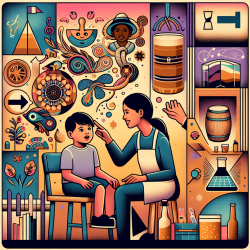The landscape of autism understanding has significantly evolved since its initial clinical description. Once considered a rare childhood disorder, autism is now recognized as a lifelong condition with diverse manifestations. This shift has led to the identification of many adults who were previously undiagnosed. The study titled “Peas in a pod”: Oral History Reflections on Autistic Identity in Family and Community by Late-Diagnosed Adults provides valuable insights into the experiences of these individuals, particularly focusing on those diagnosed after the age of 35. This blog post aims to help practitioners enhance their skills by implementing findings from this research and encouraging further exploration.
Understanding Shared Autistic Identity
The study involved 26 late-diagnosed autistic adults who shared their life histories through oral interviews. Using reflexive thematic analysis, researchers identified three main themes: conceptualizing the autistic family, creating autistic community, and contesting autistic identity. These themes highlight the importance of shared autistic identity and community for late-diagnosed individuals.
Conceptualizing the Autistic Family
Many participants discovered their autism following their children's diagnoses. This revelation often led to a deeper connection with their children and other family members who exhibited similar traits. Practitioners can use this insight to foster family-centered approaches that emphasize shared experiences and strengths rather than deficits.
Creating Autistic Community
The study emphasizes the role of community in forming a positive autistic identity. Participants found value in connecting with other autistic individuals through both face-to-face interactions and online platforms. For practitioners, facilitating opportunities for autistic individuals to engage with supportive communities can enhance social connections and well-being.
Contesting Autistic Identity
Despite the benefits of a shared identity, some participants faced skepticism from others regarding their diagnosis. Practitioners should be aware of these challenges and support individuals in navigating these complex social dynamics while reinforcing positive self-identification.
Implications for Practitioners
The findings from this study underscore the importance of understanding autism as a dynamic identity shaped by personal experiences and community interactions. Practitioners can enhance their skills by:
- Promoting Family Engagement: Encourage families to explore shared traits and experiences that can strengthen bonds and improve mutual understanding.
- Facilitating Community Connections: Support initiatives that connect autistic individuals with communities that celebrate neurodiversity.
- Acknowledging Diagnostic Challenges: Provide guidance on addressing skepticism or rejection of autism diagnoses within families or social circles.
- Encouraging Self-Advocacy: Empower autistic individuals to advocate for themselves by fostering environments that respect and validate their identities.
Encouraging Further Research
This study opens avenues for further research into how late-diagnosed adults construct their identities within familial and communal contexts. Practitioners are encouraged to engage with participatory research methods that include autistic voices in shaping future studies.
To read the original research paper, please follow this link: “Peas in a pod”: Oral History Reflections on Autistic Identity in Family and Community by Late-Diagnosed Adults.










